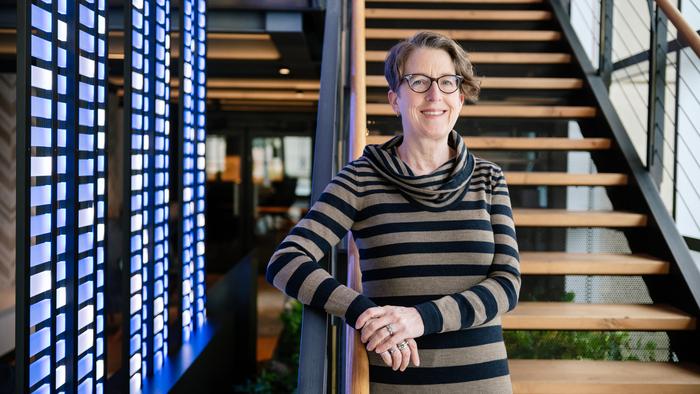SAN FRANCISCO—A multidisciplinary research team at Gladstone Institutes, led by Senior Investigator Katie Pollard, PhD, has received $5 million in funding through a newly launched grant program designed to ignite a fresh wave of cancer discoveries using computational biology and artificial intelligence.

Credit: Michael Short/Gladstone Institutes
SAN FRANCISCO—A multidisciplinary research team at Gladstone Institutes, led by Senior Investigator Katie Pollard, PhD, has received $5 million in funding through a newly launched grant program designed to ignite a fresh wave of cancer discoveries using computational biology and artificial intelligence.
The new Transformative Computational Biology Grant Program from the Biswas Family Foundation, in partnership with the nonpartisan think tank Milken Institute, is providing a total of nearly $14 million to five research groups.
At Gladstone, the grant establishes the Biswas Center for Transformative Computational Cancer Biology, where scientists will fuse powerful machine learning with cutting-edge experimental technologies to help identify and prioritize which research avenues are most likely to lead to success in the area of cancer diagnosis and treatment.
“Our tools and discoveries will be freely shared, fueling a global acceleration of cancer biology research and the development of therapies specialized to each type of cancer mechanism,” says Pollard, who also serves as director of the Gladstone Institute of Data Science and Biotechnology. “This should help patients and their doctors make well-informed decisions about cancer care.”
The new center’s suite of deep learning models is capable of performing trillions of editing experiments to generate and rank testable hypotheses about how changing a cell’s DNA will alter its function and interactions with other cells. Focused initially on colorectal and skin cancers, the group hopes to identify molecular mechanisms overlooked by other researchers and to develop a predictive understanding of how cancer immunotherapies work.
Notably, the Gladstone program is designed to apply equal research emphasis across rare cancer pathways and non-European genetic ancestries, which should generate much-needed information in these understudied areas.
And while the primary focus is cancer biology, the center has potential to advance medicine in many areas.
Sanjit Biswas, co-founder of the Biswas Family Foundation and CEO of Samsara, first crossed paths with Pollard last fall in Washington, D.C., when Pollard delivered an attention-getting presentation on computational biology at a workshop organized by the Milken Institute.
Biswas and his wife, Hope, an infectious disease epidemiologist, had recently established the Biswas Family Foundation and were looking to support scientific research and programs with the potential to improve lives on a global scale. Milken’s leadership thought Pollard’s data science programs meshed with the foundation’s priorities. And indeed, after studying Pollard’s proposal to accelerate cancer research with the aid of a computer framework and deep learning models, the Biswas team was more than intrigued.
“It’s cancer biology but it has the potential to advance medicine in many areas,” says Hope Biswas, PhD. “And, looking at it from a global health perspective, it’s really scalable and likely very cost effective.”
In addition to Pollard’s team at Gladstone, the Biswas Family Foundation awarded grants to research groups from Stanford University, Massachusetts Institute of Technology, and Harvard University.
“The research and health ecosystem has entered an era where vast amounts of data are continuously being generated,” Sanjit Biswas says. “The convergence of powerful computers, big data, and AI is already transforming human health in remarkable ways. And when you amass a lot of smart people in a place like Gladstone, really interesting things are bound to happen.”
The center’s co-Investigators at Gladstone include: Alex Marson, MD, PhD, Barbara Engelhardt, PhD, Catherine Tcheandjieu Gueliatcha, DVM, PhD, Christina Theodoris, MD, PhD, Karin Pelka, PhD, Ryan Corces, PhD, Seth Shipman, PhD, and Vijay Ramani, PhD.




